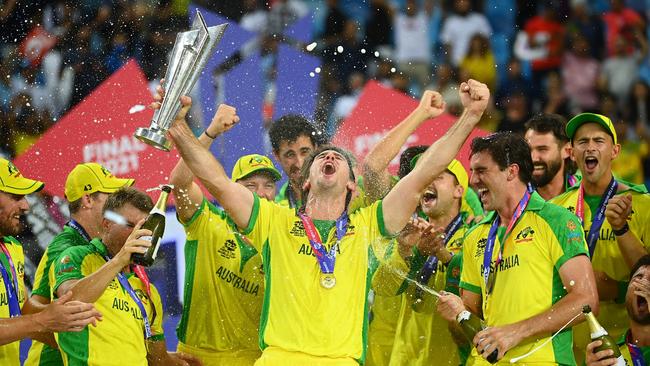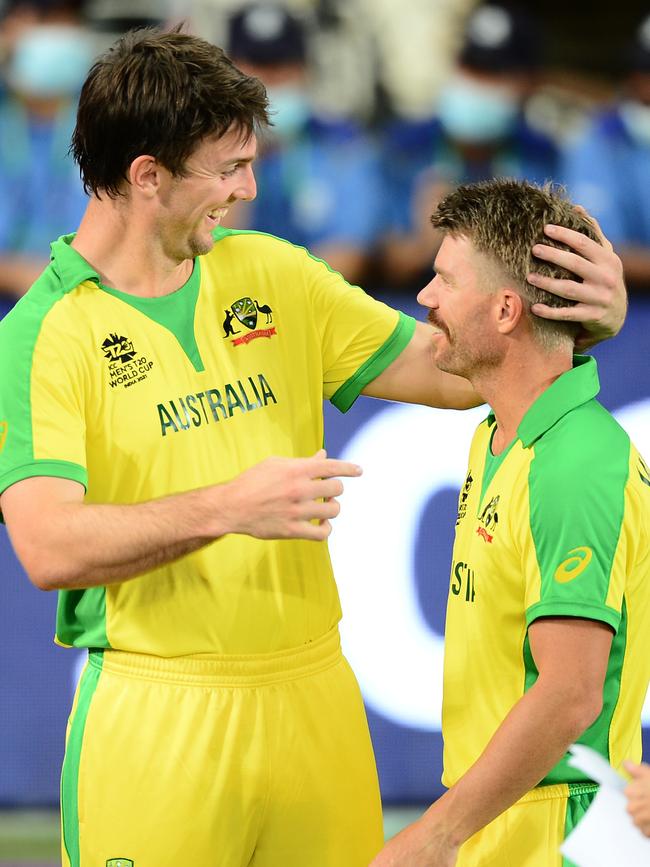Collective maturity overcomes individual dynamism as Australia wins T20 World Cup

There was a time when Australia turned up to global cricket events and expected to find their name already engraved on the trophy. That is a while ago now. In the past dozen years, their sole men’s victory in an ICC tournament had come as co-host in 2015’s 50-over World Cup.
But, not perhaps coincidentally, this squad drew more than half its members from that squad, plus its chairman of selectors.
And experience, it turned out, was an edge in a keenly-contested, low-scoring, bio-bubble-wrapped tournament. This was a win for collective maturity rather than individual dynamism.
There were only two Australians among the T20 World Cup’s top 20 runmakers; their certified T20 match winners in Glenn Maxwell and Mitchell Starc were useful rather than overwhelming contributors; Steve Smith might almost have been watching it on television for all his influence.
But when it came to the nuts and bolts of T20, constriction in the middle overs, construction of a chase, and calm at clutch moments, Australia shone. In resilience too. Aaron Finch’s team followed their worst performance with their best.
Overpowered by England at great expense to their net run rate on October 30, Australia crushed a timid Bangladesh five days later to cancel out the defeat’s effects, needing only two deliveries beyond the Powerplay to win by eight wickets.
They also learned from the setback the merit of sticking to their knitting, rather than indulging in the vogue for match-ups.
Whatever merit there had been to choosing Ashton Agar to probe away against England’s right-handers, omitting Mitchell Marsh had come at a cost to their batting that early losses exacerbated.
So they overlooked Agar against Pakistan’s right-handers, and in the final Marsh towered over the Black Caps like a mighty jarrah impervious to the axe. His first three deliveries from the speedy Adam Milne vanished for 14. At 30, he is a substantial cricketer, perhaps Finch’s successor as white ball captain.
If New Zealanders rewatch the final, they’ll want to punch “Skip Intro”. They were chugging along at less than a run a ball after 10 overs, should have lost Kane Williamson then did lose Martin Guptill.
Without left-hander Devon Conway to counteract Adam Zampa, they left their captain too much catching up to do, valiantly as he strove.

Then David Warner. He started this Cup in not so much poor form as no form, having been a supernumerary at his franchise in the second half of the Indian Premier League. A jink in his back foot was suggestive of a musician half a beat behind the conductor.
Sharpening his footwork on a concrete pitch, Warner caught up with and overtook the game. He played the shot of the tournament in the semi-final, somehow getting under a Mohammed Hafeez dragdown to mow it in the stands. In the final he reached a 34-ball half-century with a six off Jimmy Neesham that followed more or less the same flight path.
No Cup is won without good fortune. Unlike England, who suffered two huge outs in opening bat Jason Roy and death bowler Tymal Mills, Finch’s men sidestepped injury and indisposition.
Patchy with the bat, Finch was purposeful with the coin, winning six out of seven tosses and making each count by electing to chase — the standard battle order of the event.
Coach Justin Langer? Australia had cut some curious capers in their white ball tour of the West Indies and Bangladesh earlier in the year, as Langer stuck with a full-dress, five-man attack — a repeat of what had worked for him with the Perth Scorchers.
In July, for example, Finch’s team had chased 200 against the West Indies with numbers seven to eleven occupied by Zampa, Josh Hazlewood, Andrew Tye, Mitchell Swepson and Jason Behrendorff — a self-amputating tail.
There was discontent in the camp. Some hard conversations were had, even if an inscrutable LinkedIn message on the eve of the tournament was read as suggesting that Australia’s was not for turning.
Instead, Australia tacked back, entrusting four overs an innings to part-timers for the sake of the extra batter that allowed everyone to play with a little extra freedom, and basically getting away with it.
Maxwell’s fourteen overs cost 7.1 runs each; Marsh and Marcus Stoinis yielded 73 runs in eight overs but brought their bludgeoning bats; Matthew Wade dropped into number seven like a penny into a slot.
In fact the coach was barely heard of for the month, even when a surly minority were scandalised by the sight of countrymen down on one knee. He bore, instead, an ever-widening smile of satisfaction, as resolve was rewarded, and plans fructified. Might that tour of the Caribbean and Asia now be regarded as the recession Australian T20 had to have?





This was one for the true believers. And, to be frank, these were mighty scarce when Australia congregated in the UAE a month ago for the T20 World Cup, were monstered in a warm-up match by India, and won only tentatively against South Africa in Abu Dhabi.